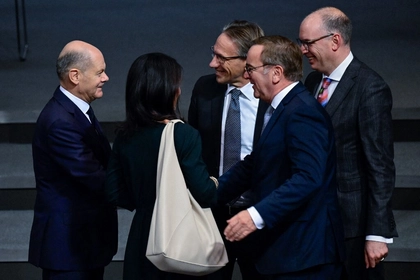Germany will be able to provide most of the €4 billion pledged to Ukraine despite the collapse of the coalition government, sources from the budget committee told Reuters.
German Chancellor Olaf Scholz dismissed Finance Minister Christian Lindner on Wednesday and announced a January confidence vote, plunging Germany into political turmoil following Donald Trump’s U.S. election win. The collapse of Scholz’s coalition leaves him likely heading a minority government.
JOIN US ON TELEGRAM
Follow our coverage of the war on the @Kyivpost_official.
The funds for Ukraine are largely committed appropriations and can therefore be disbursed under provisional budget management if the budget is not passed, four sources said.
German aid to Ukraine was cut to €4 billion in 2025 from around €8 billion in 2024, according to the draft of the 2025 budget.
Germany hoped Ukraine would be able to meet the bulk of its military needs with the $50 billion in loans from the proceeds of frozen Russian assets approved by the Group of Seven industrialized nations.
However, the return of Republican Donald Trump to the White House raises concerns in Europe that U.S. support for Kyiv could diminish.
Government sources said Scholz had wanted to increase a Ukraine support package by €3 billion to €15 billion and to finance it by suspending the debt brake, a law that limits borrowing. Lindner said the chancellor had tried to strong-arm him into breaking the spending limit, which Lindner, a fiscal hawk, refused to support.

Russia Claims Capture of Two More East Ukraine Villages
Germany remains an important partner for Poland Despite the collapse of the coalition government, Poland’s foreign minister, Radosław Sikorski said on Thursday that: “Germany remains an important partner; just yesterday we were planning to hold another meeting of the Weimar Triangle in Warsaw, it will take place next month.”
He also recalled that German Interior Minister Nancy Faeser recently visited the Polish-Belarusian border.
“We hope that Germany will appreciate our role for the whole Schengen Zone,” Sikorski said, referring to Poland's efforts to seal the EU's eastern border.
The Weimar Triangle is a format of tri-lateral cooperation between Poland, Germany and France
Reprinted from TVP World. See the original here.
You can also highlight the text and press Ctrl + Enter






